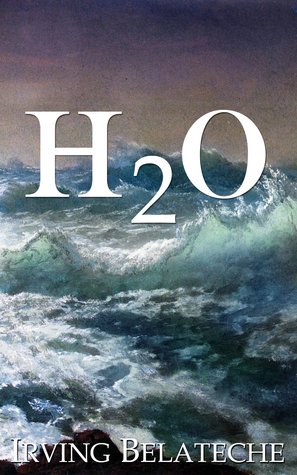 H2O by Irving Belateche
H2O by Irving Belateche Format: ebook
Source: purchased from Amazon
Formats available: paperback, ebook
Genres: dystopian, post apocalyptic, science fiction, thriller
Pages: 198
Published by Laurel Canyon Press on November 8, 2012
Purchasing Info: Author's Website, Amazon, Bookshop.org
Goodreads
Roy Walker is curious. But in a world where knowledge has disappeared, curiosity will get you killed.
Generations ago, the Passim Virus wiped out most of humanity. The survivors banded together to form the Territory and, now, decades later, no one questions why knowledge has disappeared. Why should they? They're lucky to be alive.
But Roy doesn't feel so lucky. He's haunted by the murder of his father and he's ostracized by everyone in town. He asks way too many questions, especially about the water pumped out by the town's desalination plant.
Then Roy finds a tantalizing clue that leads him down the coast of what used to be the state of Oregon. He's stunned at what he discovers. Everything in the Territory is a lie and everything around him is a front. But to uncover the dark secret behind this front, Roy must venture deeper into the wilderness where marauders and the deadly Passim Virus wait to kill.
It's there, outside the Territory, where he discovers the truth about his father's murder and where he meets his unexpected destiny -- To free humanity from the bondage of a powerful enemy.
Guest review by Amy:
Curiosity killed the cat, the old saying goes, though Roy Walker probably never has known that, since quite a lot of the vast body of human knowledge has been lost. Once the Passim Virus wiped out vast swaths of humanity, the survivors didn’t have time to… wait.
They didn’t have time to keep up a lot of the tools and technology that actually would have made surviving easier? Something doesn’t add up here.
Escape Rating: B+: I’m normally excited about post-apocalyptic adventure/thrillers; to me, it’s interesting to see how the author constructs their world. Does it look kind of like ours? What technologies develop in the ad hoc world after whatever-it-was-that-happened? What technology and culture falls by the wayside? Action, adventure, romance, all those things being in there are all a big plus to the central theme of “modern” humans trying to survive.
Author Irving Belateche has given us a slice of our own world, on the US West Coast, and quite a lot of it looks familiar. Houses, people, vehicles, even the desalination plant that our protagonist maintains, all look more-or-less normal. There are just lots of empty houses, and no one knows, really, what’s outside “the Territory,” and everyone’s scared to find out, because of the Virus.
To me, right from that point, this story has a problem for me. Humankind likes to connect, to explore, to get out there in the wild blue yonder and find things out. It’s what we do, and it’s made us the apex life form on this planet over the last several thousand years, and even gotten us into space.
To see a huge area of the United States cut itself off and be content with that strikes me as odd, right out of the gate. And a question in my mind from the get-go was “what happened to the libraries?” There are quite a few great big ‘uns along the Washington-Oregon-California coast; surely someone would have thought to go look for a computer repair manual in one of them? Or a copy of Programming Perl? Instead, we’re led to believe that writing software and maintaining computers are some magical voodoo that few can do–and, indeed, people are punished for doing so. As a software developer on my day job, and having worked with developers for thirty years, I’m just not buying this. Life, and software, always finds a way, to borrow loosely from Jurassic Park, but Belateche somehow wants us to believe that that’s not the case. Humanity’s vast banks of knowledge – libraries – are thoroughly ignored, not even mentioned once in the book.
I’ll let that go, for a moment, and suspend the big disbelief that threw me off-kilter here. The story itself has a lot of interesting points. There’s the worry about catching the Virus, the traveling without the “Fibs” (law enforcement) finding them, even a whiff of what could have eventually turned into some kind of love interest. Roy Walker is curious where all the water goes, naturally, since he maintains the water plant, and he knows it makes more than his local community could be using. That drives him to do something he shouldn’t (“finally! Someone acting like a real human,” Amy says to herself) and he goes to find out where all the water is going. At first, he thinks it’s corruption or some other criminal activity, but of course we’re given a deeper reason, and that is, in fact, why the Virus happened in the first place. There’s a decent adventure story under the hood here, and once Roy figures out what’s really going on, a straightforward redeem-humanity plot emerges from the earlier confusion. Our accidental hero is quite heroic, our villain suitably nasty, and the final confrontation satisfying.
Other people have liked this book a lot more than I did, from the reviews. My problem, as I noted above, is that it required a little more suspension of disbelief a little more than I was willing to give it. If that doesn’t present a problem for you, and you like post-apocalyptic stories, this one might be one you’d enjoy. It wasn’t my favorite, but it wasn’t a stinker, either.
